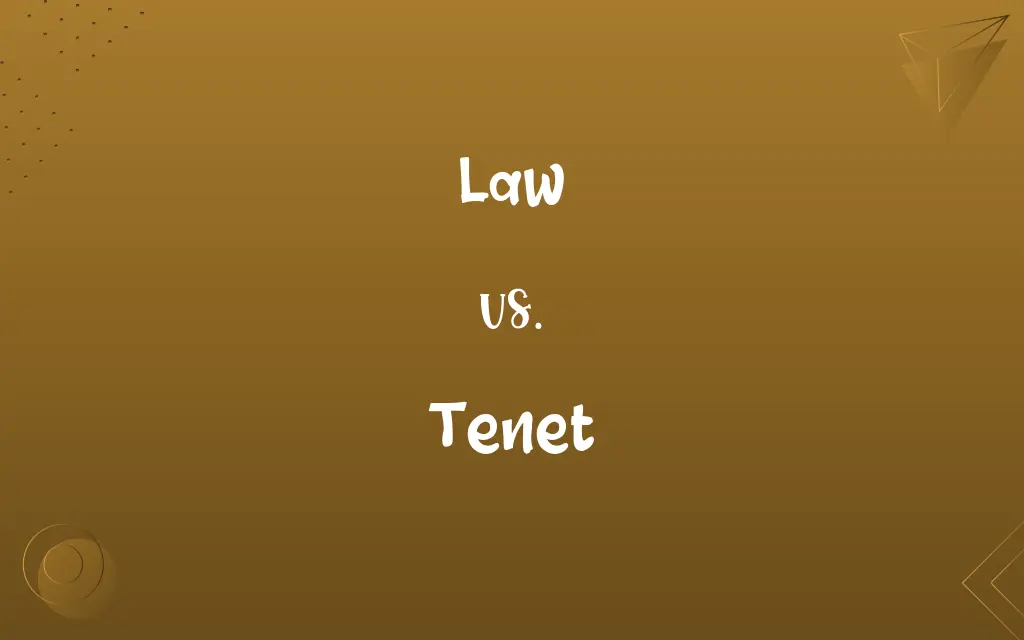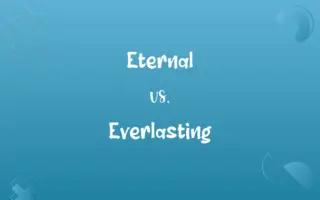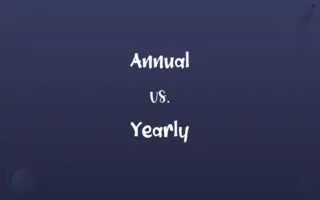Law vs. Tenet: Know the Difference

By Shumaila Saeed & Hifza Nasir || Updated on March 4, 2024
Law is a system of rules enforced through social or governmental institutions, while tenet is a principle or belief, especially one of the main principles of a religion or philosophy.

Key Differences
Law is established and enforced by governmental or social institutions to regulate behavior, prescribing what is acceptable and what is not within a society. Whereas tenet refers to a principle or belief held as true by an individual or group, often related to moral, religious, or philosophical grounds without the requirement of legal enforcement.
Hifza Nasir
Mar 04, 2024
Laws are legally binding and can lead to penalties or sanctions if violated, highlighting their role in maintaining order and justice in a society. On the other hand, tenets, while deeply influential on personal or group behavior, do not carry legal consequences if not adhered to but may influence social standing or acceptance within a community.
Shumaila Saeed
Mar 04, 2024
The creation of laws involves a formal process, including drafting, debate, and approval by legislative bodies or authoritative figures. Tenets, however, are often derived from long-standing traditions, religious doctrines, or philosophical ideologies and are accepted based on faith, morals, or ethical considerations.
Shumaila Saeed
Mar 04, 2024
Laws require compliance from citizens and organizations within a jurisdiction, emphasizing their external imposition on society. In contrast, tenets are voluntarily embraced by individuals or groups based on belief systems, reflecting an internal acceptance rather than external enforcement.
Hifza Nasir
Mar 04, 2024
The interpretation and application of laws can evolve over time through judicial decisions, amendments, or changes in societal norms. Tenets, while they may also evolve, are more likely to remain constant within a belief system, emphasizing their role as foundational and enduring principles.
Shumaila Saeed
Mar 04, 2024
ADVERTISEMENT
Comparison Chart
Enforcement
By governmental or social institutions
By personal or group conviction
Shumaila Saeed
Mar 04, 2024
Origin
Legislative processes and legal precedents
Religious, moral, or philosophical traditions
Dua Fatima
Mar 04, 2024
ADVERTISEMENT
Evolution
Through formal amendments and judicial rulings
Through shifts in interpretation or belief
Shumaila Saeed
Mar 04, 2024
Law and Tenet Definitions
Law
A rule of conduct or action prescribed or formally recognized as binding and enforced by a controlling authority.
The law requires that all drivers stop at red lights.
Dua Fatima
Mar 04, 2024
Tenet
A doctrine that is taught.
The tenets of democracy are taught in many educational institutions.
Shumaila Saeed
Mar 04, 2024
Law
A statement of fact, deduced from observation, to the effect that a particular natural or scientific phenomenon always occurs if certain conditions are present.
The law of gravity explains why objects fall towards the Earth.
Shumaila Saeed
Mar 04, 2024
ADVERTISEMENT
Tenet
A principle or belief, especially one of the main principles of a religion or philosophy.
Non-violence is a central tenet of some religions.
Hifza Nasir
Mar 04, 2024
Law
The body of such rules concerned with a particular subject or derived from a particular source.
Criminal law deals with behavior that is or can be construed as an offense against the public, society, or the state.
Shumaila Saeed
Mar 04, 2024
Tenet
A fundamental belief that influences one's actions and choices.
The tenet that honesty is the best policy is widely accepted.
Dua Fatima
Mar 04, 2024
Law
The system of rules that a particular country or community recognizes as regulating the actions of its members.
International law governs relations between sovereign nations.
Hifza Nasir
Mar 04, 2024
Tenet
A conviction or belief held to be true by an individual or group.
It is a tenet of classical economics that markets self-regulate.
Shumaila Saeed
Mar 04, 2024
Law
Legislation considered as a body of laws.
The new tax law was passed by the legislature last year.
Shumaila Saeed
Mar 04, 2024
Tenet
A guiding principle for behavior or thought.
The tenet of respect for all life guides ethical vegetarians.
Shumaila Saeed
Mar 04, 2024
Law
A rule of conduct or procedure established by custom, agreement, or authority.
Shumaila Saeed
Oct 19, 2023
Tenet
A doctrine, principle, or position held as part of a philosophy, religion, or field of endeavor.
Shumaila Saeed
Oct 19, 2023
Law
The body of rules and principles governing the affairs of a community and enforced by a political authority; a legal system
International law.
Shumaila Saeed
Oct 19, 2023
Tenet
An opinion, belief, or principle that is held as absolute truth by someone or especially an organization.
Shumaila Saeed
Oct 19, 2023
Law
The condition of social order and justice created by adherence to such a system
A breakdown of law and civilized behavior.
Shumaila Saeed
Oct 19, 2023
Tenet
Any opinion, principle, dogma, belief, or doctrine, which a person holds or maintains as true; as, the tenets of Plato or of Cicero.
That al animals of the land are in their kind in the sea, . . . is a tenet very questionable.
The religious tenets of his family he had early renounced with contempt.
Shumaila Saeed
Oct 19, 2023
Law
A set of rules or principles dealing with a specific area of a legal system
Tax law.
Criminal law.
Shumaila Saeed
Oct 19, 2023
Law
The system of judicial administration giving effect to the laws of a community
All citizens are equal before the law.
Shumaila Saeed
Oct 19, 2023
Repeatedly Asked Queries
What is a tenet?
A tenet is a principle or belief, especially one of the main principles of a religion or philosophy.
Shumaila Saeed
Mar 04, 2024
Can laws change?
Yes, laws can evolve over time through legislative amendments, judicial decisions, or changes in societal norms.
Shumaila Saeed
Mar 04, 2024
What is a law?
A law is a rule of conduct or action prescribed by a controlling authority, and having legal binding force.
Hifza Nasir
Mar 04, 2024
Do tenets change?
Tenets can evolve, but they tend to remain more constant within a belief system, changing primarily through shifts in interpretation or belief.
Dua Fatima
Mar 04, 2024
Who creates laws?
Laws are created through formal processes involving legislative bodies, governments, or authoritative figures.
Shumaila Saeed
Mar 04, 2024
Who creates tenets?
Tenets are often derived from religious, moral, or philosophical traditions and accepted based on faith or ethical considerations.
Dua Fatima
Mar 04, 2024
How are tenets enforced?
Tenets are enforced by personal or group conviction, without legal penalties but with possible social or personal implications for non-adherence.
Shumaila Saeed
Mar 04, 2024
Are laws universal?
Laws vary by jurisdiction and are not universal, applying only within specific geographic or societal boundaries.
Shumaila Saeed
Mar 04, 2024
Can anyone propose a new law?
While generally legislative bodies or governments propose laws, individuals can influence lawmaking through petitions, advocacy, or representation.
Hifza Nasir
Mar 04, 2024
What happens if you break a law?
Breaking a law can result in legal penalties, such as fines, imprisonment, or other sanctions.
Shumaila Saeed
Mar 04, 2024
How are laws enforced?
Laws are enforced through societal or governmental institutions, which can impose penalties or sanctions for violations.
Shumaila Saeed
Mar 04, 2024
Do laws apply to everyone?
Laws apply to all individuals and organizations within the jurisdiction in which they are enacted, regardless of status or belief.
Shumaila Saeed
Mar 04, 2024
Are tenets universal?
While tenets can be widely accepted within a belief system, they are not universally applicable and vary among different groups.
Hifza Nasir
Mar 04, 2024
Can tenets be debated?
Yes, tenets can be debated, especially as societies and belief systems evolve, but changes in tenets often require a shift in collective belief or understanding.
Shumaila Saeed
Mar 04, 2024
What happens if you don't follow a tenet?
Not following a tenet can lead to social or personal repercussions within the community that holds the tenet, but not legal penalties.
Hifza Nasir
Mar 04, 2024
Share this page
Link for your blog / website
HTML
Link to share via messenger
About Author
Written by
Shumaila SaeedShumaila Saeed, an expert content creator with 6 years of experience, specializes in distilling complex topics into easily digestible comparisons, shining a light on the nuances that both inform and educate readers with clarity and accuracy.
Co-written by
Hifza Nasir








































































